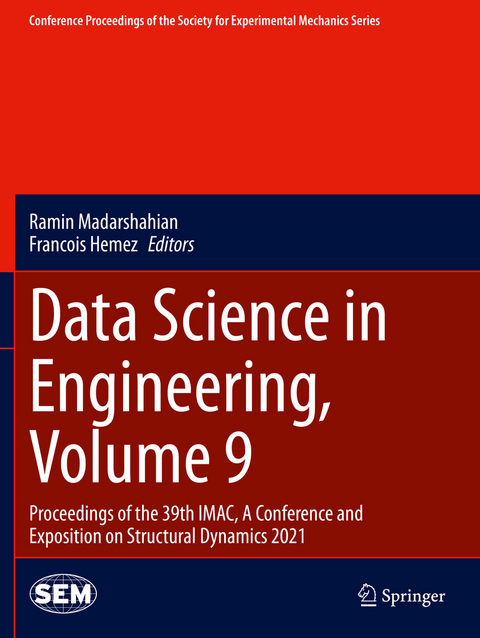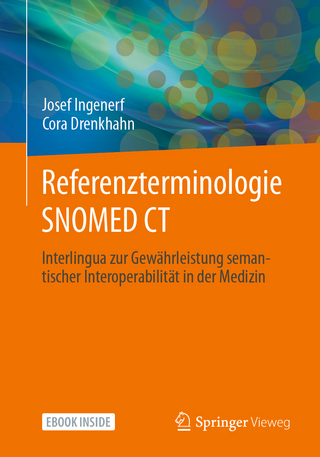
Data Science in Engineering, Volume 9
Springer International Publishing (Verlag)
978-3-030-76006-9 (ISBN)
Data Science and Engineering Volume 9: Proceedings of the 39th IMAC, A Conference and Exposition on Structural Dynamics, 2021, the ninth volume of nine from the Conference, brings together contributions to this important area of research and engineering. The collection presents early findings and case studies on fundamental and applied aspects of Data Science in Engineering, including papers on:
Data Science in Engineering Applications
Engineering Mathematics
Computational Methods in Engineering
Ramin Madarshahian, University of San Diego, CA, USA; Francois Hemez, Lawrence Livermore National Laboratory, Livermore, CA, USA.
Chapter 1. Towards a Population-based Structural Health Monitoring, Part V: Networks and Databases.- Chapter 2. Active Learning of Post-Earthquake Structural Damage with Co-Optimal Information Gain and Reconnaissance Cost.- Chapter 3. Uncertainty-Quantified Damage Identification for High-Rate Dynamic Systems.- Chapter 4. Real-time Machine Learning of Vibration Signals.- Chapter 5. Data-Driven Identification of Mistuning in Blisks.- Chapter 6. On Generating Parametrised Structural Data Using Conditional Generative Adversarial Networks.- Chapter 7. Best Paper: On an Application of Graph Neural Networks in Population Based SHM.- Chapter 8. Estimation of Elastic Band Gaps Using Data-Driven Model.- Chapter 9. Damage Localization on Lightweight Structures with Non-Destructive Testing and Machine Learning Techniques.- Chapter 10. Challenges for SHM from Structural Repairs: An Outlier-informed Domain Adaptation Approach.- Chapter 11. On the Application of Heterogeneous Transfer Learning to Population-based Structural Health Monitoring.- Chapter 12. An Unsupervised Deep Auto-Encoder with One-Class Support Vector Machine for Damage Detection.- Chapter 13. Identifying Operations- and Environmental-Insensitive Damage Features.- Chapter 14. Hybrid Concrete Crack Segmentation and Quantification Across Complex Backgrounds without Big Training Dataset.- Chapter 15. Digital Stroboscopy using Event-Driven Imagery.- Chapter 16. Managing System Inspections for Health Monitoring: A Probability of Query Approach.- Chapter 17. Parameter Estimation for Dynamical Systems Under Continuous and Discontinuous Gaussian Noise Using Data Assimilation Techniques.- Chapter 18. Model Reduction of Geometrically Nonlinear Structures via Physics-Informed Autoencoders.- Chapter 19. Techniques to Improve Robustness of Video-Based Sensor Networks.- Chapter 20. Grey-Box Modelling via Gaussian Process Mean Functions for Mechanical Systems.- Chapter 21. On Topological Data Analysis for SHM; An Introduction toPersistent Homology.- Chapter 22. Heteroscedastic Gaussian Processes for Localising Acoustic Emission.- Chapter 23. Transferring Damage Detectors Between Tailplane Experiments.- Chapter 24. High-Rate Structural Health Monitoring and Prognostics: An Overview.- Chapter 25. One Versus All: Best Practices in Combining Multi-Hazard Damage Imagery Training Datasets for Damage Detection for a Deep Learning Neural Network.- Chapter 26. High-Rate Damage Classification and Lifecycle Prediction via Deep Learning.- Chapter 27. A Generalized Technique for Full-field Blind Identification of Travelling Waves and Complex Modes from Video Measurements with Hilbert Transform.- Chapter 28. Privacy-Preserving Structural Dynamics.- Chapter 29. Abnormal Behavior Detection of the Indian River Inlet Bridge through Cross Correlation Analysis of Truck Induced Strains.- Chapter 30. A Video-Based Crack Detection in Concrete Surfaces.- Chapter 31. Bayesian Graph Neural Networks for Strain-Based Crack Localization.- Chapter 32. Routing of Public and Electric Transportation Systems Using Reinforcement Learning.- Chapter 33. Vibration based Damage Detection and Identification in a CFRP Truss with Deep Learning and Finite Element Generated Data.- Chapter 34. Parametric Amplification in a Stochastic Nonlinear Piezoelectric Energy Harvester via Machine Learning.
| Erscheinungsdatum | 07.10.2022 |
|---|---|
| Reihe/Serie | Conference Proceedings of the Society for Experimental Mechanics Series |
| Zusatzinfo | VIII, 291 p. 225 illus., 198 illus. in color. |
| Verlagsort | Cham |
| Sprache | englisch |
| Maße | 210 x 279 mm |
| Gewicht | 737 g |
| Themenwelt | Informatik ► Theorie / Studium ► Algorithmen |
| Informatik ► Theorie / Studium ► Künstliche Intelligenz / Robotik | |
| Mathematik / Informatik ► Mathematik ► Angewandte Mathematik | |
| Technik | |
| Schlagworte | Civil structures • conference proceedings • Data Science • Dynamic Substructures • experimental techniques • modal analysis • model validation • structural dynamics • Structural engineering |
| ISBN-10 | 3-030-76006-5 / 3030760065 |
| ISBN-13 | 978-3-030-76006-9 / 9783030760069 |
| Zustand | Neuware |
| Haben Sie eine Frage zum Produkt? |
aus dem Bereich


